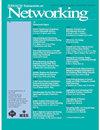FPCA: Parasitic Coding Authentication for UAVs by FM Signals
IF 3.6
3区 计算机科学
Q2 COMPUTER SCIENCE, HARDWARE & ARCHITECTURE
引用次数: 0
Abstract
De-authentication attack is one of the major threats to Unmanned Aerial Vehicle (UAV) communication, in which the attacker continuously sends de-authentication frames to disconnect the UAV communication link. Existing defense methods are based on authentication by digital passwords or physical channel features. But they suffer from replay attacks or cannot adapt to the UAV mobility. In this paper, instead of enhancing the in-channel authentication, we leverage the ambient broadcasting signal to establish a low-cost additional channel for authentication. Different from methods using another dedicated secure communication channel to perform an independent authentication, we use the ambient FM radio broadcasting channel and couple the two channels by encoding parasitic bits on the host signals of the broadcasting channel, which is called parasitic coding. To further enhance the security, we propose the FM-based Parasitic Coding Authentication (FPCA) that leverages elaborate host signal processing and vector coding to ensure that the attacker cannot decode our authentication even knowing the FM receiving frequency. We implement FPCA on the embedded UAV platform. The extensive experiments show that FPCA can resist replay attacks and brute force searching, achieving reliable continuous authentication for UAVs.基于调频信号的无人机寄生编码认证
去认证攻击是无人机通信面临的主要威胁之一,攻击者通过不断发送去认证帧来断开无人机通信链路。现有的防御方法是基于数字密码或物理通道特征的身份验证。但它们受到重放攻击或不能适应无人机的机动性。在本文中,我们不是增强信道内认证,而是利用环境广播信号建立一个低成本的附加信道进行认证。与使用另一个专用的安全通信信道进行独立认证的方法不同,我们使用环境调频无线电广播信道,并通过在广播信道的主机信号上编码寄生比特来耦合两个信道,称为寄生编码。为了进一步提高安全性,我们提出了基于FM的寄生编码认证(FPCA),它利用复杂的主机信号处理和矢量编码来确保攻击者即使知道FM接收频率也无法解码我们的认证。我们在嵌入式无人机平台上实现了FPCA。大量的实验表明,FPCA可以抵抗重放攻击和暴力搜索,实现了无人机可靠的连续认证。
本文章由计算机程序翻译,如有差异,请以英文原文为准。
求助全文
约1分钟内获得全文
求助全文
来源期刊

IEEE/ACM Transactions on Networking
工程技术-电信学
CiteScore
8.20
自引率
5.40%
发文量
246
审稿时长
4-8 weeks
期刊介绍:
The IEEE/ACM Transactions on Networking’s high-level objective is to publish high-quality, original research results derived from theoretical or experimental exploration of the area of communication/computer networking, covering all sorts of information transport networks over all sorts of physical layer technologies, both wireline (all kinds of guided media: e.g., copper, optical) and wireless (e.g., radio-frequency, acoustic (e.g., underwater), infra-red), or hybrids of these. The journal welcomes applied contributions reporting on novel experiences and experiments with actual systems.
 求助内容:
求助内容: 应助结果提醒方式:
应助结果提醒方式:


